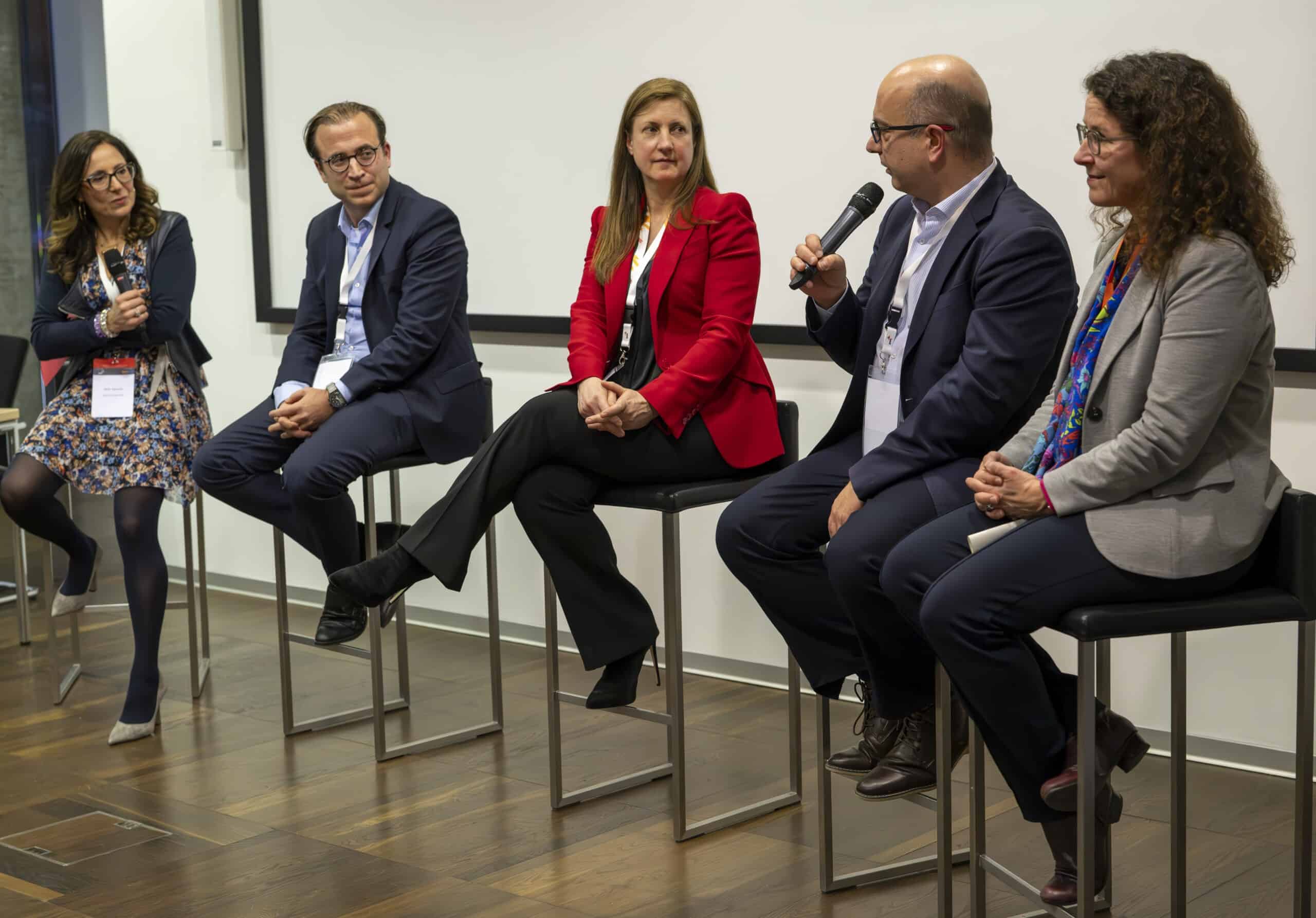At the second Swiss Insurtech ecosystem meeting organized by Swiss Insurtech Hub at the beginning of the week, an illustrious panel spoke about «Embedded Sustainability: Insurance Innovation for a Greener Tomorrow». Seven start-ups from Israel and six start-ups from Switzerland presented their companies. thebroker attended the event at the premises of Pricewaterhouse Coopers (PwC).
We have been aware of sustainability not only since the global «Fridays for Future». Following the example of initiator Greta Thunberg, pupils and students met on the street on Fridays. Awareness of sustainability has existed since the early 1970s.
The participants
The participants were invited by the non-profit organization Swiss Insurtech Hub, which was founded in 2021 and aims to digitize and innovate the future of the Swiss insurance industry. The panelists included Antonios Koumbarakis (Partner PwC Switzerland), Sabine Döbeli (CEO Swiss Sustainable Fiance), Penny Seach (CUO Zurich Insurance), Luca Zerbini (Founding Partner and CEO UnaTerra VC Fund). The questions were asked by Silvia Signoretti (Co-Founder and CEO Swiss Insurtech Hub).
What was discussed?
Sofie Simon (Senior Manager PwC) welcomed the panel as host and mentioned the recently published results of the PwC study «Sustainability on the M&A agenda» on financial service providers in Switzerland and Liechtenstein. According to the study, 48 percent of the companies surveyed ranked sustainability among the top three priorities of their overall corporate strategy. 45 percent stated that the main driver for integrating sustainability criteria into business activities is corporate values/guidelines. 59 percent of respondents believe that sustainability plays a (very) important role in a deal and 66 percent of companies plan to integrate sustainability aspects into due diligence in the next three years.
Swiss Re’s recent acquisition of Fathom was also mentioned. The UK-based company specializes in water risk information and flood modelling and is expected to enhance the capabilities of Swiss Re’s Reinsurance Solutions division.
At Zurich Insurance, they don’t just think about big green innovations, but also about the small ones, says Penny Seach. As owners of properties and assets, insurers play a major role in terms of energy and water efficiency. It’s not about disclosing balance sheets and technologies or exposing companies‘ reputations, but about knowledge and solutions for introducing things that accelerate the transition.
«We act too slowly»
Energy efficient management system (EMS) means, for example, collecting and analyzing data from buildings to determine the coverage of energy per square meter, adds Antonios Koumbarakis. These considerations are important so that insurers ultimately know what investments they need to make and how to insure the buildings. Switzerland is living in a 1.6-degree scenario if it carries on like this. We are acting too slowly and the climate targets of net zero by 2050 will therefore not be achieved. Only the introduction of further taxes by the regulatory authorities will probably make this possible.
When temperatures rise by three or four degrees
On the other hand, the population must be well informed about the risks they face if the temperature were to rise by three or four degrees. Over 30 percent of biodiversity would be lost and, among other things, flooding would increase, says Luca Zerbini. This is the only way to convince people to meet the targets in 26 years‘ time and not to emit more greenhouse gases into the atmosphere than are absorbed by natural and technical reservoirs.
Innovations are needed
Sabine Döbeli replies that the positive side should also be mentioned. She believes that change can only be brought about through innovation. There is no government in the world that could enforce the desired Co2 price. To solve the problem, cheap and globally available renewable energies are needed. She sees encouraging approaches.
Penny Seach did not entirely agree with this. She is of the opinion that the technology already exists, but the economy does not yet. They need to be convinced that investing in renewable energy is worthwhile. As soon as the price of renewable energy falls significantly, all infrastructure must be ready for its use.
What are the EU and the shipping industry doing?
Antonios Koumbarakis mentions the European Union (EU), which is now subsidizing certain areas such as electrolysis and solar energy on a large scale. The shipping industry is also considering whether to use hydrogen, biogas or nuclear power in the future. At some point, as soon as possible, a decision will have to be made as to which form of energy the whole world will agree on. Under no circumstances should we do it alone. Even in Europe alone, there is no consensus on this.
In Switzerland, voters approved the «Climate and Innovation Act» in the referendum on June 18, 2023 with 59.1 percent in favour. The net zero target of 1.5 degrees Celsius set by the Intergovernmental Panel on Climate Change was adopted by the Federal Council in 2019 in response to the Intergovernmental Panel on Climate Change (IPCC) special report. An even greenhouse gas balance still seems a long way off. It is time for everyone involved to act.
Another article about the 13 start-ups from Israel and Switzerland follows.
Binci Heeb
Read also: Swiss Insurtech Hub: Ecosystem Meetup on February 5th





